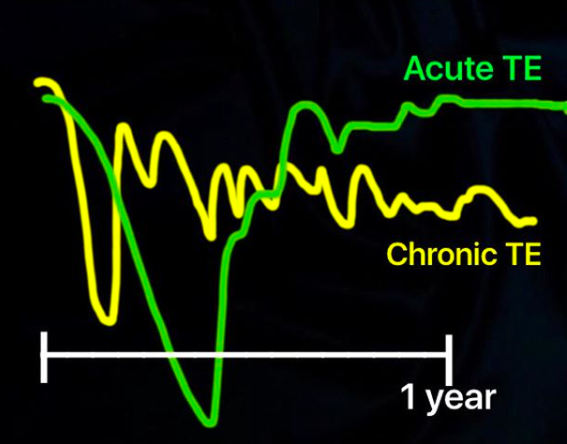Chronic Telogen Effluvium: Will I go bald?
Chronic Telogen Effluvium: What is it and will I go bald?
Chronic telogen effuvium is a unique condition. it’s a hair shedding condition that typically develops in women 35-70. Women report the condition to a much greater extent than men. Women develop increased hair shedding that can sometimes be quite profound yet at other times be quite minimal. The condition can go on for many years. In most cases, a trigger can’t be clearly found although there may be many best guesses. Patients with CTE may have a variety of symptoms including itching, tingling, burning and soreness when the hair is moved.
Patients with true isolated CTE do not go bald because CTE is not a condition of hair loss. Rather, it's a condition of hair shedding. Patients with true CTE lose hair density first and then look the same year after year after year after year. Therefore, it follows that photos are an essential part of the evaluation and management of CTE! In contrast, in true “acute” telogen effluvium, patients lose density first and then once the trigger is fixed (ie the low iron or thyroid problem), the hair grows back.
This graph shows the change in hair density in Acute vs Chronic Telogen Effluvium
Comparison of Hair Density Over TIme in Patients with Chronic Telogen Effluvium vs Acute Telogen Effluvium. In CTE, the hair drops to a new density and then remains at that density for many, many years. in acute TE, the hair grow back once the trigger is identified.
If density keeps changing over time another diagnosis might be also present with the CTE (or present instead of the CTE).
The 2005 Sinclair Study
If you are going to really come to understand a thing or two about CTE, you need to understand an important study from 2005. The study captures very nicely the essence of CTE. Professor Rodney SInclair studied five women diagnosed with chronic telogen effluvium and followed their photos for a minimum of 7 years. Four of the 5 women continued to shed year after year after year and shedding fluctuated in severity. However, serial photographs over time showed no visible reduction in hair density, and serial scalp biopsy specimen showed no follicular miniaturization. These 4 women showed no tendency toward development of female pattern hair loss or to spontaneous improvement. One woman was diagnosed with female pattern hair loss as well.
Treatment of CTE
The Treatment of CTE has been discussed in our other articles (see below) and includes a vareity of growth promoting agents to true to keep hairs in the growth phase. This includes topical and oral minoxidil, low level laser, and various supplements.
Previous Articles on Chronic Telogen Effluvium (CTE)
Those who are interested may wish to review my previous articles on CTE.
Do I have chronic telogen effluvium (CTE) ?
Chronic Telogen Effluvium: Most patients don't develop AGA
Acute and chronic telogen effluvium - what's the difference?
Scalp symptoms (burning, tingling, pain) and chronic telogen effluvium
Chronic telogen effluvium vs Genetic hair loss - Easily confused !
Acute vs Chronic Telogen Effluvium: A Closer Look
Oral Minoxidil for Chronic Telogen Effluvium
Reference
Sinclair R. Chronic telogen effluvium: a study of 5 patients over 7 years. J Am Acad Dermatol. 2005 Feb;52(2 Suppl 1):12-6.
This article was written by Dr. Jeff Donovan, a Canadian and US board certified dermatologist specializing exclusively in hair loss.

